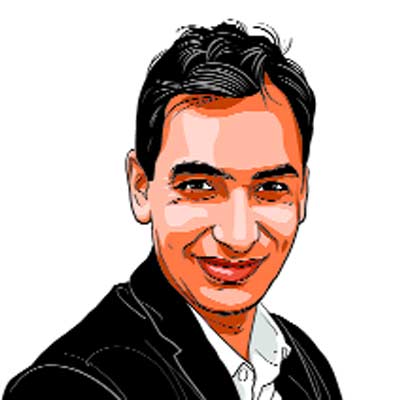Opinion How Putin’s war, economic struggles, and migration issues led to an electoral swerve in Germany
Against the backdrop of economic and political turmoil, German voters have delivered a key verdict with resonance at home and overseas -- the Centre-right Christian Democratic Union has emerged as the largest party but without a majority, with the far-right Alternative for Germany (AfD) emerging as the second largest party.
 What lies ahead for Germany has wider resonance given its role at the heart of European politics and impact on key partners and allies globally. (AP)
What lies ahead for Germany has wider resonance given its role at the heart of European politics and impact on key partners and allies globally. (AP) A momentous election in Germany has concluded against the background of economic sluggishness and political turmoil, with consequences beyond its shores. The Centre-right Christian Democratic Union (CDU) has emerged as the largest party but without a majority. Voters have also delivered a shockwave, with the far-right Alternative for Germany (AfD) emerging as the second largest party, leaping ahead of the incumbent Social Democrats (SPD). As Friedrich Merz, the 69-year-old CDU leader looks set to become chancellor, he will need to navigate the dynamics of a coalition government. What lies ahead for Germany has wider resonance given its role at the heart of European politics and impact on key partners and allies globally.
The backdrop to the election was marked by uncertainty and upheaval. Few Germans believe that their country is heading in the right direction. Rarely has such anxiety hung over Europe’s biggest economy. The reasons are plainly discernible. Putin’s invasion of Ukraine laid threadbare not just German dependence on Russian energy but also raised fundamental questions about Germany’s economic and foreign policy. The Trump administration has also exposed challenges regarding Europe’s defence spending.
Domestic anxiety over irregular migration was a key feature of the election campaign. A series of attacks by asylum seekers in recent years and associated institutional failings loomed as a theme for voters. The latest tragedy took place on the eve of the elections on February 21 when a Spanish tourist was attacked by a Syrian refugee at Berlin’s Holocaust Memorial. On the economic side, while Germany has not been alone in grappling with a cost-of-living crisis, the underwhelming performance of its famous manufacturing sector has impacted the national mood greatly. It was no surprise therefore that Olaf Scholz’s incumbent SPD failed to persuade voters.
The electoral results should be viewed through the lens of this deep unease. The spectacular rise of the AfD, which obtained close to 20 per cent of the votes, underscores that mainstream parties ignore voter disaffection at their peril. We have seen this trend elsewhere too, for instance in the UK where the rise of Nigel Farage’s Reform party was a feature of last year’s elections, or, in Austria, with the rise of the Freedom party. It is not for nothing that US Vice-President JD Vance recently warned at the Munich Security Conference that democracies should not “firewall” political parties. He was alluding to the long-standing arrangement in Germany between mainstream political parties to shun cooperation with AfD and other far-right elements at the federal or state level. At this stage though, if the CDU sticks with this “brandmauer” philosophy, it will have to rely on the SDP and others to form a government. Navigating this terrain to provide stability and decisiveness will be a key challenge for Merz.
What other aspects should Chancellor Merz prioritise? First, reviving Germany’s economy should be his most pressing task. If Germany continues to be in economic doldrums, that has consequences for Europe too. Merz’s campaign stressed the need to reduce red tape and welfare bills but spelled little details about the implementation. Unfunded tax cuts also raised queries about spending in his administration. But that takes us to the “debt brake”, a constitutional provision that bars German governments from running anything more than minuscule deficits. As admirable as Germany’s fiscal rectitude has been, the reality is that capital spending on infrastructure has been severely curtailed by this rule. It may be time for Merz to examine a slight relaxation to boost the economy, noting that it will need an appropriate legislative process.
Geo-politically, Merz will need to absorb the key messages coming from the Trump administration. It is clear that Trump has lost patience with NATO allies who continue to rely on the US for defence support while not contributing to defence spending themselves. Domestically, and in Brussels, Merz may have to persuade partners to spend at least 2 per cent of GDP on defence, if not more.
The spectre of tariffs imposed by the Trump administration also looms as a key risk. That would be challenging for Germany’s export-oriented model. Merz will therefore need to actively mediate between the US and the EU to ensure that free and frictionless trade can take place as much as possible. Given his centre-right economic leaning, he could be a key interlocutor in that dialogue.
Promoting free trade between Germany and Britain should also be in his interest. With French President Emmanuel Macron’s popularity waning, Merz may have a key role when it comes to rebuilding ties with Britain. The other major crisis confronting Merz and Europe is illegal immigration. Merz will need to address feedback that Germany and Europe’s borders are not secure. Voters expect concrete action in this sensitive area.
The clear message from the election is that German voters feel that their country needs a “zeitenwende”, a turning point. As Merz prepares to put together a coalition government, he should pay heed to this. Mere incrementalism may not suffice. For Germany to reclaim its image of dynamism, progress and efficiency pioneered by the legendary Audi slogan “Vorsprung durch Technik” (progress through technology) needs to become a reality. The truth is that Chancellor Merz has no option but to be bold in the days ahead.
The writer is a London-based lawyer and political commentator






